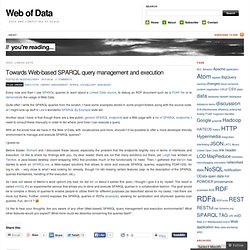

SPARQLpedia. Towards Web-based SPARQL query management and execution « Web of. Every now and then I use SPARQL queries to learn about a Linked Data source, to debug an RDF document such as a FOAF file or to demonstrate the usage of Web Data.

Quite often I write the SPARQL queries from the scratch, I have some examples stored in some project folders along with the source code, or I might look-up stuff in Lee‘s wonderful SPARQL By Example slide set. Another issue I have is that though there are a few public, generic SPARQL endpoints and a Wiki page with a list of SPARQL endpoints, I need to consult these manually in order to tell where (and how) I can execute a query. With all the know-how we have in the Web of Data, with vocabularies and more, shouldn’t it be possible to offer a more developer-friendly environment to manage and execute SPARQL queries?
I guess so. Before Easter, Richard and I discussed these issues, especially the problem that the endpoints slightly vary in terms of interfaces and execution. SPARQL + pubsubhubbub = sparqlPuSH. There have been lots of discussion recently regarding dynamics and notification in the Semantic Web realm, including various vocabularies for describing changes and approaches for notifying them – as Leigh recently blogged about it . Last month, while visiting Kno.e.sis , Pablo an I worked on an approach using pubsubhubbub for RDF changes notification, that I’m happy to announce today. The result is sparqlPuSH , an interface that can be plugged on any SPARQL endpoint and that broadcast notifications to clients interested in what’s happening in the store using the pubsubhubbub protocol.
At a glance, anyone can register a particular query to the RDF store (e.g. list all microblog posts, or list any changes made by X, using the Changesets vocabulary ) and results are provided in an RSS / Atom feed that is then sync-ed using pubsubhubbub: each time new data corresponding the register query is added into the store, the store itself notifies the interested parties of such updates.